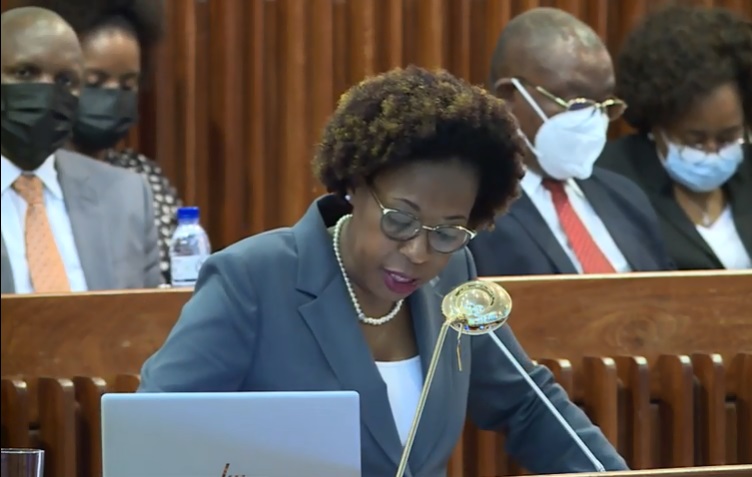Mozambique: 325 families from Mocímboa da Praia arrive in Mueda - Administrator
Untrue that Mozambique has withdrawn accusations of bribery against Privinvest – AIM

Screen grab: Miramar
The claim that the Mozambican state has withdrawn its accusation that the Abu Dhabi based group Privinvest paid huge bribes to high ranking Mozambican officials is nothing but “disinformation”, Attorney-General Beatriz Buchili told the country’s parliament, the Assembly of the Republic, on Thursday, during a debate on her annual report on the state of justice in the country.
The legal battle between the Mozambican government and Privinvest arises from the scandal of Mozambique’s “hidden debts” – a term referring to the loans of over two billion US dollars made in 2013 and 2014 by the banks Credit Suisse and VTB of Russia to three fraudulent Mozambican companies, Proindicus, Ematum (Mozambican Tuna Company) and MAM (Mozambique Assets Management).
The loans were only possible because the banks carried out no due diligence on the three companies, which had no business record and were effectively run by the Mozambican security service, SISE, and because the Mozambican government of the day, under President Armando Guebuza, issued illegal loan guarantees, in violation of the 2013 and 2014 budget laws, and of the Mozambican constitution.
Massive corruption was involved in the loans, as was admitted by the three Credit Suisse managers who negotiated them, Andrew Pearse, Detelvina Subeva, and Surjan Singh. These three people were among those charged by American prosecutors, who took a close interest in the case because the US financial system had been abused, and US investors were swindled. According to the prosecutors, at least 200 million dollars of the loan money was diverted into bribes and kickbacks.
Privinvest was closely involved in the bribery as became clear in the 2019 trial in New York of Privinvest official Jean Boustani. Privinvest was very much an interested party since it became the sole supplier to Proindicus, Ematum and MAM. An independent audit into the two companies in 2017 showed that Privinvest had vastly inflated the prices it charged for the fishing boats and other assets it supplied. This over-invoicing was estimated at around 700 million dollars.
The Mozambican Attorney-General’s Office (PGR) began proceedings in London in 2019 against five companies in the Privinvest group, and the owner of the group, the Lebanese bilonnaire Iskandar Safa. It is also suing Credit Suisse and the three Credit Suisse officials who have admitted taking Privinvest bribes, Pearse, Subeva and Singh.
The key demand from the PGR is that the London court should declare null and void the government guarantee on the 622 million dollar loan arranged by Credit Suisse for ProIndicus, on the grounds that this debt, along with the rest of the loans were part of a gigantic fraud.
Buchili said that Privinvest had always tried to separate the claims of bribery from the illicit loan guarantees, but for the government , they could not be separated. “The issuing of the guarantees cannot be dissociated from the bribes paid by Privinvest, because it was Privinvest that organised the whole process which culminated in the issuing of the guarantees and the contacts to supply equipment and services to the three companies”, she told the Assembly.
The first London court ruling agreed with the Mozambican case – but then Privinvest appealed, and the London appeals court ruled that the case should go to arbitration – apparently accepting the claim by Privinvest that the correct jurisdiction is the International Arbitration Tribunal in Switzerland.
But to the surprise of the Mozambican side, the London appeals court did not merely take the questions of bribery out of the case, but dispensed Privinvest completely from the civil suit brought by Mozambique.
Buchili said that Mozambique does not accept this and is now appealing to the Supreme Court in England.
“We have not forgotten that it was Privinvest which orchestrated the whole scheme which culminated in issuing the guarantees”, she declared.
Antonio Muchanga, a deputy from the main opposition party, Renamo, had asked how much money the PGR was paying for the case in London. Buchili replied that any case outside the country inevitably involved paying for lawyers and other costs.
Defending the interests of the Mozambican state was one of the responsibilities of Buchili’s office, and that inevitably involved spending money. Furthermore, enormous sums of money were already at stake, since the fraudulent loans covered by the illicit guarantees amounted to more than two billion dollars.
Currently, the illegality of the loans was only accepted in Mozambique. The loans had been arranged through the London branches of Credit Suisse and VTB, and so action had to be taken under English law to have the loans and their guarantees declared illegal in London too. That inevitably meant that the PGR had to hire competent lawyers authorised to practice in the London courts.
Buchili told the deputies that “if the real debtors – the companies – fail to pay, and we took no legal action opposing payment of the debts, then the loan guarantees would be activated”.
Since the Mozambican authorities believed the guarantees were illegal, the PGR had pressed ahead with the London case. The only other option would be to pay the debts.
“The civil suit in London is a State imperative, and it serves the interests of the Mozambican people, expressed in the concept that illegal debts should not be paid”, Buchili declared.
She did not say how much the PGR had spent on the London case – but told Muchanga that the figures would be published in the General State Account for 2020.












Leave a Reply
Be the First to Comment!
You must be logged in to post a comment.
You must be logged in to post a comment.